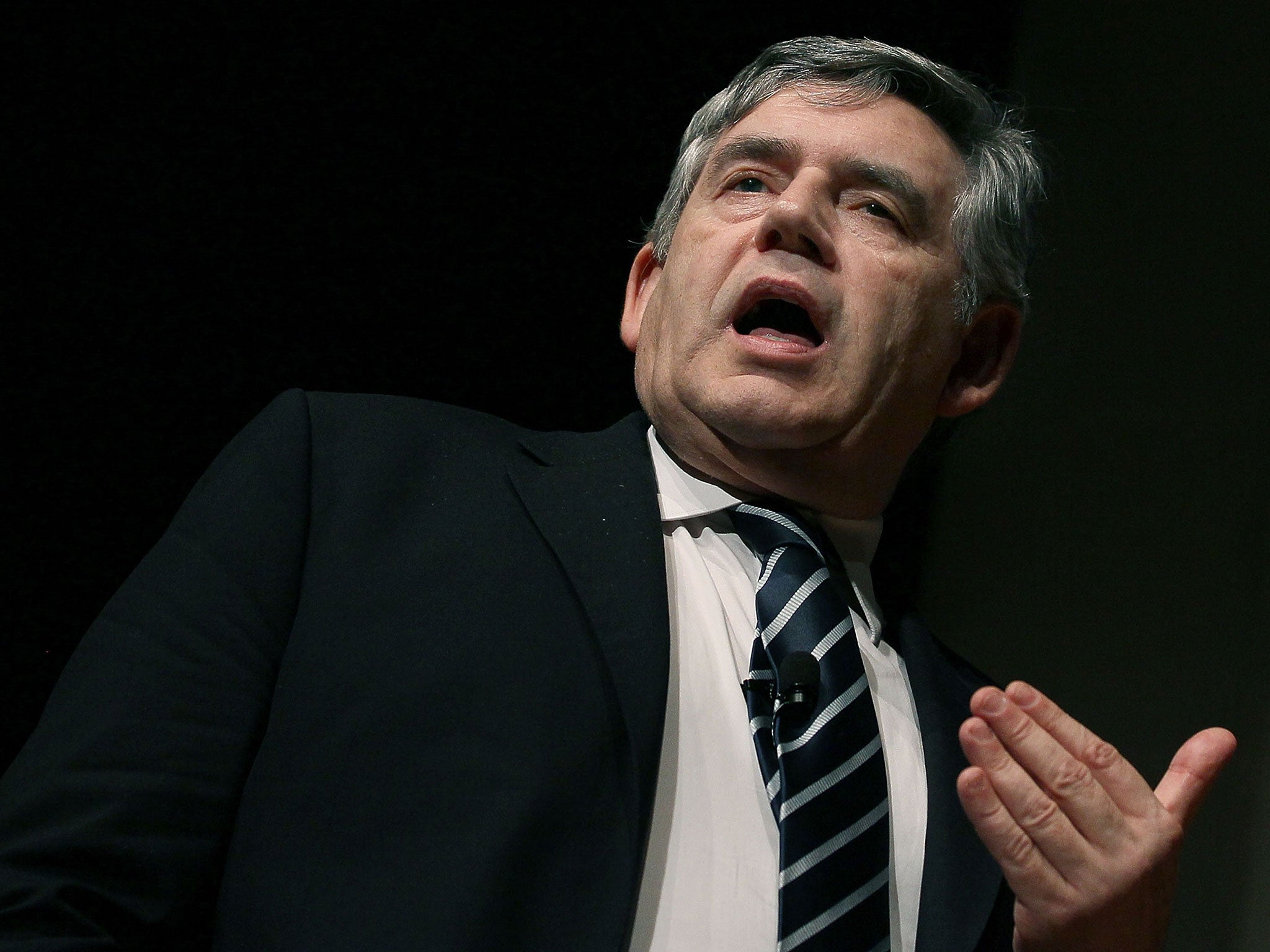Gordon Brown announces decision to stand down as MP
The former Prime Minister is expected to announce his decision tonight

Your support helps us to tell the story
From reproductive rights to climate change to Big Tech, The Independent is on the ground when the story is developing. Whether it's investigating the financials of Elon Musk's pro-Trump PAC or producing our latest documentary, 'The A Word', which shines a light on the American women fighting for reproductive rights, we know how important it is to parse out the facts from the messaging.
At such a critical moment in US history, we need reporters on the ground. Your donation allows us to keep sending journalists to speak to both sides of the story.
The Independent is trusted by Americans across the entire political spectrum. And unlike many other quality news outlets, we choose not to lock Americans out of our reporting and analysis with paywalls. We believe quality journalism should be available to everyone, paid for by those who can afford it.
Your support makes all the difference.The former Prime Minister Gordon Brown has announced he will stand as an MP at the next general election.
Mr Brown is the Labour MP for Kirkcaldy and Cowdenbeath and served as chancellor in Tony Blair's government between 1997 and 2003.
He went on to serve as Prime Minster from 2007 to 2010, where Labour was then defeated in the worst general election result for the party since 1983.
The 63-year-old announced in a speech in his Kirkcaldy constituency tonight that he will step down at the general election in May, after playing a key role in the Scottish independence referendum campaign this year.
He told constituents it was time for a "new person, with new ideas" to represent them.
"We are not leaving Fife. It is London that I'm leaving and for the avoidance of any doubt, I'm not going back to Westminster, not to the House of Commons after the general election and not to the House of Lords," he said.
"It is Fife where our home is and where we will be, where our children John and Fraser, who are here tonight, are happily at school and it is from Fife where I will do the new and extended work as the United Nations special envoy on global education."
Since his resignation as prime minister in 2010, Mr Brown has focused on charity work and his role as United Nations special envoy for global education.
But he Mr Brown was widely praised for his rousing speeches in the final days of referendum campaigning, where he at one point shouted: “This is everyone’s flag, everyone’s country.”
His promise to fast-track more powers to Scotland is widely credited as influencing the majority "no" vote outcome.
He had been tipped to stand for the Scottish Labour leadership following the shock resignation of Johann Lamont, but instead made clear he had no intention of returning to frontline politics.
He won the Kirkcaldy and Cowdenbeath seat with a majority of more than 23,000 in the last election, but only made occasional appearances in the House of Commons.
Born the son of a Church of Scotland minister in 1951, Mr Brown attended Edinburgh University aged just 16. There, he suffered a rugby accident which blinded him in one eye and he required lengthy treatment to save the sight in the other.
While working as a politics lecturer and journalist, he fought his way into a prominent position in the Scottish Labour Party, arriving at Westminster in 1983 as MP for Dunfermline East.
He joined the front benches within the next two years and was shadow chancellor by 1992.
After the surprise death of John Smith in 1994, he was viewed by many as a natural successor. But he struck a deal with Tony Blair, who would take the leadership in return for a promise of control over economic policy and an eventual handover of power.
Together, the two men forged the New Labour machine, but the deal carried in it the seeds of their future rivalry, with apparently reliable reports of furious rows behind the scenes in Downing Street as Mr Brown demanded Mr Blair name a date for the succession.
After 10 years at the Treasury, where he earned a reputation as the "Iron Chancellor" who claimed to have ended boom and bust, Mr Brown finally replaced Mr Blair at 10 Downing Street on June 27, 2007.
His three years at the helm of British politics are remembered by a huge financial crisis as the UK fell into a recession. He largely retreated from public life after resigning as a prime minister and Labour leader in 2010, making his addresses during the referendum even more notebale.
Former Labour chancellor Alistair Darling will also stand down as an MP at the next general election in the wake of the referendum.
Additional reporting by PA
Join our commenting forum
Join thought-provoking conversations, follow other Independent readers and see their replies
Comments